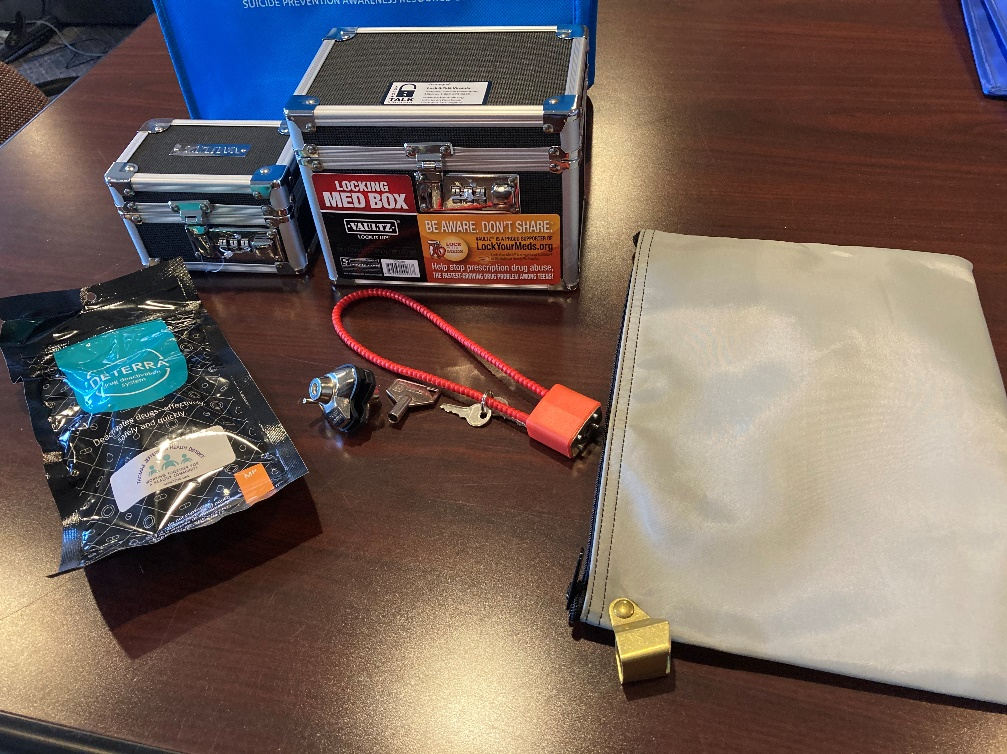
January 26, 2021
Do Your Part For Safety: Free Harm Reduction Devices Available Through Region Ten
You can prevent suicide and drug misuse with the help of FREE harm reduction safety devices. To learn more about how to order and available supplies, click HERE. To place an order, complete this simple form.
Why is it important to take steps to improve home safety?
Both suicide and overdose continue to be ongoing concerns for our community. While Virginia saw a slight decrease in opioid overdose deaths in 2023, there is still work to be done. You can help play a part in preventing suicide and drug misuse by creating a plan to keep your home and community safe.
How do I create a safety plan to prevent suicide and drug misuse?
Creating a plan to keep your home safe is as simple as 1-2-3. Region Ten is part of the Lock and Talk Virginia initiative, which encourages community members to:
- Lock Meds: Use lock bags and boxes to safely keep prescription medications such as painkillers, anxiety pills, or sedatives out of reach from those who may misuse them.
- Lock Guns: Use lock safes and trigger locks to keep firearms safely stored away.
- Talk Safety: Have a conversation with your family and friends about mental health, safety, and substance misuse.
Science shows these methods work. Creating a barrier to lethal means of suicide, such as a firearm or prescription medication can help save lives. Suicide attempts usually happen within a short period of crisis, and locking these items in your home can allow time for reflection and to get help.
For more information about the Lock and Talk campaign, see www.lockandtalk.org.
How do I request free safety supplies to help prevent suicide and drug misuse?
Region Ten and the Community Mental Health Coalition are now offering free safety devices and materials which include:
- Lock boxes (to store prescription medications and small firearms)
- Medication lock bags (to store and discretely travel with medications)
- Trigger locks (to add an extra security measure to firearms)
- Drug deactivation packets (to safely dispose of unwanted prescription medication)
- Naloxone (to reverse an opioid overdose)
- Testing strips (to test for fentanyl, benzodiazepine, xylazine, nitazine)
To request your free safety devices, please complete this simple form: Safety Devices Request Form.
Pickup is available at the Region Ten offices in Charlottesville, Albemarle, Nelson, Fluvanna, Greene, and Louisa.
How do I recognize signs of suicide risk?
Recognizing signs and symptoms of suicide risk is an important way to keep your family and community safe. Individuals who may be at immediate risk of suicide might:
- Talk about wanting to die or having no reason to live
- Try to obtain a gun, lethal doses of medications, or look for other ways to kill oneself
- Talk about feeling hopeless or helpless
- Talk about being a burden to others
- Increase drug or alcohol use
- Withdraw from family or friends
- Sleep too much or too little
- Give away prized possessions
- Act anxious or agitated or behave recklessly
How do I recognize signs of substance misuse?
There can be many signs of substance misuse, depending on which substances someone might be using or the extent of the problem. Some common general signs include:
- Changes in weight or eating habits
- Changes in personality or energy levels
- Irregular sleeping patterns
- Changes in activities or hobbies
- Shifts in social circles
- Poor performance in work or school
- Secretive behavior
- Isolating oneself
- Financial problems
How do I “talk safety,” or begin a conversation with someone I am concerned about?
If you are concerned about someone at risk of suicide or substance misuse, it is best to talk with the person directly. Show care, speak honestly and directly, listen without judgement, give reassurance, and offer help.
If you are worried that someone is thinking about suicide, ask directly, “Are you thinking about killing yourself?” If the answer is “yes,” then listen carefully about how that person is feeling and what they are thinking, and be ready to connect them to help. In an emergency, call 9-1-1. For immediate support and guidance any time day or night, call the 988 Suicide and Crisis Lifeline.
Knowing someone you love may be thinking about suicide, or misusing drugs can be hard on your emotional well-being. Remember to take care of your own mental health, and reach out to a lifeline center or community resources for help if needed.
For more information about how to talk with someone about mental health concerns or substance misuse, go HERE:
- American Foundation for Suicide Prevention conversation guide
- SAMHSA’s tools for substance use conversations
- Seize the Awkward- mental health conversation guides for young people
Where can I go for help?
Suicide prevention and crisis support is available 24/7 at:
- 988 Suicide and Crisis Lifeline: (800) 273-8255
- National Crisis Text Line: Text HOME to 741741
- The Trevor Project: 1-(866) 488-7386 or text START to 678-678
- Region Ten Emergency Services: (434) 972-1800
For information about substance use treatment, see:
- Community Mental Health and Wellness Coalition: Help Happens Here
- SAMHSA’s National Helpline (also known as the Treatment Referral Routing Service) 1-(800)-662-HELP (4357) or TTY: 1-(800)-487-4889 A confidential, free, 24-hour-a-day, 365-day-a-year, information service, in English and Spanish, for individuals and family members facing mental and/or substance use disorders
